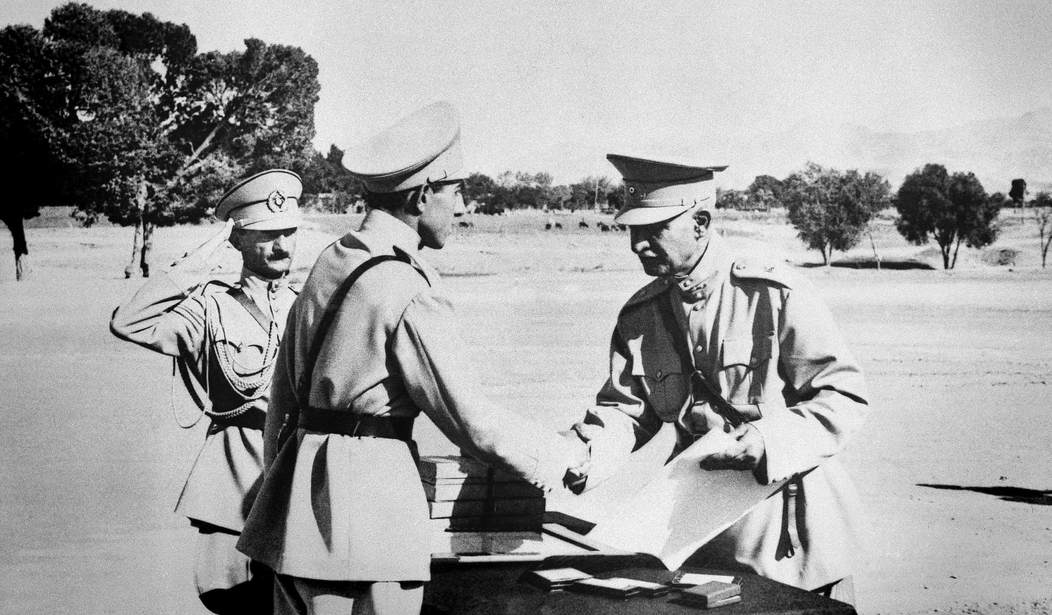The apparent discovery of the mummified remains of Reza Shah by Iranian archaeologists must have sent chills up and down the spine of Supreme Leader Ali Khamenei. Reza is the symbol of the kind of government most Iranians want: secular, tolerant, modern. His name has often been chanted in the nationwide demonstrations that have continued unabated for weeks.
We don’t get anything approaching a decent picture of the national tumult — foreign journalists are forbidden to travel outside Tehran — but I asked a well-informed Iranian if he could tell me where the demonstrations were going on, and he said “it’s easier to tell you where there aren’t any.”
The country is convulsed, and the “return of Reza Shah” will be widely taken as an omen. I wonder if Trump, Macron, and Merkel understand how powerful this event can be.
Most of the “coverage” of the Iranian uprising attributes it to misery, in keeping with the widespread belief that revolutions are driven by economic failure and the attendant social suffering. Indeed, workers have gone on strike at businesses and factories, as they have not been paid for many months. But that only accounts for part of the revolt, which has spread to mosques.
When mosques are not sparsely frequented, which is the rule, they have become sites of anti-regime outbursts. Iranians correctly see that the mullahs and ayatollahs have wrecked the country, from the ecological catastrophe (many regions are slated to run out of clean water in a matter of months) to the corruption of the ruling elite, including the elite Iranian Revolutionary Guards Corps and the supreme leader himself. They have stolen billions, while the value of the rial has crashed, approaching 1/1000th its worth at the time of the Islamic Revolution of 1979.
Meanwhile, oppression mounts. President Rouhani, who is invariably termed a “moderate reformer,” has presided over a 50% increase in the rate of publicly announced executions. The women’s revolt against the mandatory dress code covers the whole country. Schools and universities are under virtual military occupation because the regime leaders know the students detest them.
It’s a revolutionary situation, in short, and Reza Shah’s reappearance symbolizes it. Of all people, former President Mahmoud Ahmadinejad has given voice to the conviction that the regime is now on the edge of the abyss. Ahmadinejad, long regarded as one of the meanest of the hardliners, publicly said the current regime acts “in a way as if they’ll be around forever. They have no news of what’s happening. There’s not ground below their feet. Events in Iran will soon transform the whole world.”
No event would be more beneficial to the United States than the fall of the Tehran regime and its replacement with a freely and legitimately elected government. It would likely spell the doom of Assad’s Syrian tyranny, give some breathing space to those Iraqi leaders willing to fight for independence rather than submit to Iranian demands, undermine Hezbollah’s murderous domination of Lebanon and big chunks of Syria as well as their expanding operations in Latin America, deprive the Russians of a major source of cannon fodder for their Middle Eastern adventures, provide Saudi Arabia’s new leaders with victory in Yemen, and diminish radical Islamist terrorism throughout Africa.
As Ahmadinejad says, it would transform the whole world.
Yet we do not seem to be supporting revolution in Iran, even when it costs nothing and is easily done, as in changing the lineup at our Farsi-language broadcasting facilities. We learned during the Reagan years that dissidents desperately need information about their own country, and Voice of America, Radio Free Europe, and Radio Liberty successfully informed the Soviet citizenry that they were not alone — that dissidents all over the Empire were fighting for freedom.
Today, Iranians need to know that revolutionary activity challenges the regime everywhere. That we stand with them in this revolutionary moment, and that we, too, would welcome a return of the values that make Reza Shah a contemporary political force.
Instead of arguing with allies about whether to continue to adhere to an unsigned nuclear agreement with a regime that is undoubtedly cheating at every possible opportunity, we should exert every effort to defeat that evil regime.









Join the conversation as a VIP Member